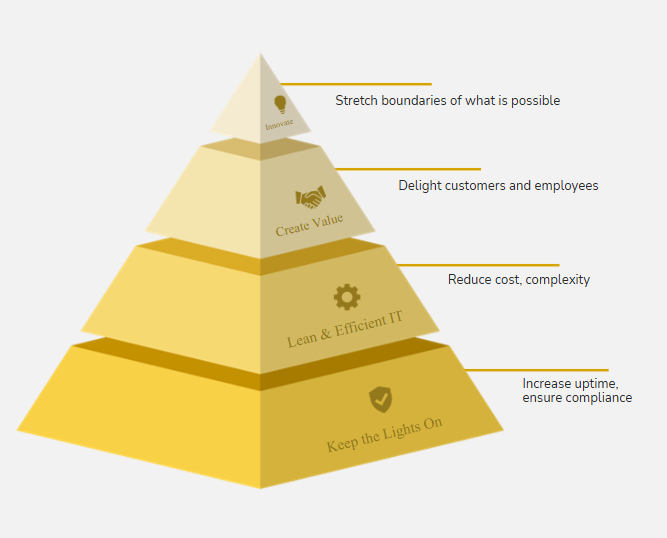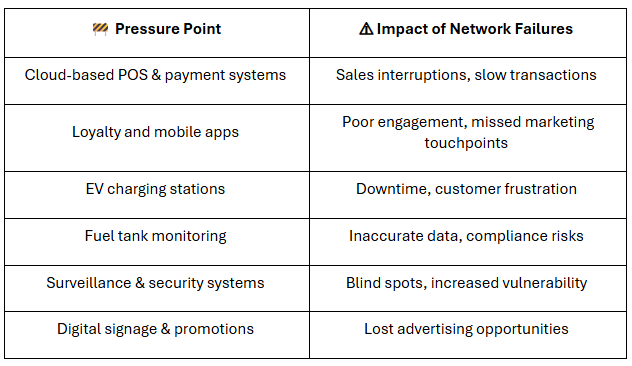In Fostering Innovation, Andrew Laudato introduces the Hierarchy of IT Needs, a powerful model that borrows from Maslow’s hierarchy of human needs. At its foundation lies the network infrastructure – not a luxury, but a non-negotiable for businesses to function successfully.
For modern retail stores – including fueling stations, convenience stores, quick serve restaurants, and more, this foundation is under more pressure than ever, thanks to an explosion of connected devices and increasingly demanding applications. Laudato’s model makes it clear: without a stable network, innovation is impossible.

This Hierarchy of IT Needs was developed by Andrew Laudato, author of “Fostering Innovation: How to Build an Amazing IT Team” and COO of The Vitamin Shoppe. This concept is drawn from Maslow’s Hierarchy of Needs.
The Network is Ground Zero in the Era of Frictionless Convenience
Today’s retailers operate in a digital environment that barely resembles store locations of the past. And the pace of technological change is increasing.
Just ten years ago, a typical convenience store might have had 5 to 10 internet-connected devices, mostly limited to point-of-sale (POS) systems, basic security cameras, and perhaps a back-office computer. Technology adoption was still ramping up, with many stores only beginning to explore mobile payments, EMV compliance, and digital signage.
Fast forward to today, that number has easily tripled, with modern retail locations averaging 15 to 30 connected devices. This includes not only upgraded POS systems and high-definition cloud-connected security cameras, but also:
- Smart POS systems, contactless payments, and mobile loyalty apps
- In-store digital signage and remotely programmable menu boards
- Smart shelves and inventory sensors
- At fuel stations: Internet-connected fuel pumps, EV chargers, and tank gauges
- AI-driven analytics and customer personalization
Each piece of this tech puzzle demands constant, high-speed, secure connectivity. Now layer on the fact that modern applications – from 8K displays to cloud-based analytics – are more bandwidth-hungry than ever. The network is no longer just infrastructure; it’s the engine.
Pressure Points: What Breaks Without a Solid Network
Here’s what happens when the network isn’t prioritized:

Each of these systems operates at the edge – often in remote or distributed locations – making network resiliency a foundational element of performance.
Fortifying the Foundation
As a retailer, it is important to have a purpose-built, PCI (Payment Card Industry)-certified, cloud-managed network solution tailored to the distributed, always-on nature of modern fueling stations and convenience stores. Your platform should bring you:
- Preconfigured plug-and-play routers for rapid, standardized deployment
- Cellular failover built-in for locations with unreliable broadband, so if your network goes down, the back-up takes over instantly
- Single-pane-of-glass management of all network endpoints
- Firewall, Wi-Fi, and VPN functionalities with zero-trust architecture built in, that only grants access to your network after strictly authenticating and authorizing every user, device, and application that attempts to access it.
- SmartATG technology for real-time tank gauge integration at fueling locations – without legacy VPNs
Rebuild from the Bottom – Don’t Bolt from the Top
Laudato’s hierarchy is a reality check for every tech leader: innovation lives at the top, but it stands on the base of a solid network foundation. Without reliable connectivity, even the best customer-facing tools crumble.
That’s why retailers need to view networking infrastructure not as a cost—but as an enabler of everything else that keeps their business up and running.
Final Take: Don’t Let the Future Outpace Your Foundation
IoT (Internet of Things). AI. Retail media. Personalization. The wave of change is already here – and it’s network-intensive.
With Mako Networks as your infrastructure partner and Laudato’s hierarchy as your strategic compass, your retail location doesn’t just keep up – it leads.
Want to learn more?
Check out our latest case study to see how Golden Oil transformed its fragmented, multi-vendor network by adopting Mako solutions.
The switch not only stabilized their network infrastructure but also led to remarkable cost savings—$754,000 saved and an over 50% reduction in annual tech spend. Don’t miss out on this opportunity; download now!

